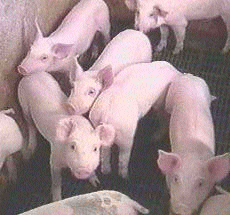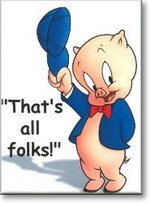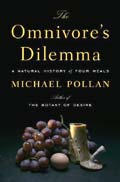
Having dined last night on way too much barbeque, I feel constrained to review part of my discussion of vegetarianism in the last entry. Last night's dinner and this morning's indigestion remind me of something that occurred to me a few months ago, not for the first time: For the most part, the less meat I eat the better I feel. Looking back at the last entry, I feel I may have seemed hostile to vegetarianism, which I'm not at all. I'm very pro-vegetarian. Really, some of my best friends are vegetarians.
I admitted I wrote that last one fast, and there were some poor word choices, one of which was, rather than saying vegetarianism was a form of escapism, it would have been more appropriate to say it was a form of
idealism. That's only if you're a vegetarian because you are opposed to the inherent cruelty to animals in meat-eating. I certainly understand the position, and as I said, I think we are all a little repulsed by the actuality of the process, or we should be if we are not insensitive to the plight of other creatures. Of course, that's the slippery slope, and knowing what I know about the factory dairy and egg industries, the philosophical position of the lacto-ovo-vegetarian doesn't make a whole lot of sense. It's pretty clear that more cruelty is inflicted on laying hens, especially, than the chickens we eat; in short, the chickens we eat, as abused as they are, are treated much better than their egg-laying sisters because if they were as ill-treated as the laying hens, we wouldn't eat them. It's that bad. So to me, if I were going to be a philosophical vegetarian, it's vegan or nothing.
Of course there's a whole other school of vegetarianism which has nothing to do with animal rights, and is not idealistic at all but pragmatic. It's the school that refuses to eat meat because of health reasons. Especially this morning I am empathetic to this school. I said in the last entry that I thought it was clear that a little meat every now and then is healthier, and there is no doubt that man evolved as a meat-eater (and probably never would have evolved to his present exalted state without it). Without outstanding success as a predator, man never would have had the leisure time to develop agriculture, which was the foundation of modern civilization. So you see it all works together. And we shouldn't forget that all domestic species now raised for food co-evolved with man in a symbiotic relationship. Nevertheless, it's a perfectly valid question whether we need to eat all that meat anymore.
I think it's pretty clear we don't. In an extremely inactive society, we just don't need that much meat. Of course our modern diet is a mess, as best illustrated by the sad plight of the current generation of obese children. Remembering just how few fat kids there were in my childhood, as compared to now, we are indeed in the middle of an "epidemic" as that word is now loosely used. Of course it also appears (to me, again) that the culprit in child obesity is not meat, but a combination of lack of exercise and
more importantly the infusion into our children's diets of massive amounts of high-fructose corn syrup (which incidentally never appeared before 1980). So that's a whole other discussion, also very much covered in Pollan's book.
But nevertheless, it appears that a much more suitable diet for today's bovine society would be a diet of whole grains and cruciferous vegetables. It certainly would be better for our digestive systems. The most disgusting twist in food fadism in recent years was the whole Atkins Diet insanity, which thankfully has faded a bit. Of course I did personally witness people losing a lot of weight on this nutball regimen, but hey kids, anorexia and bilemia will work for the same purpose, with similar results -- starvation. Especially with my guts full of flesh and hot sauce, the idea of a nation of fat people stuffing themselves with
nothing but meat leads me to images of their digestive tracts from which I am rapidly retreating.
My personal experience is that when I am happy and healthy and getting good exercise and my brain chemisty is firing well, the less meat I eat, the better I feel. When I have been sick or hung over or in some other form debilitated, nothing brings me back faster than meat. So for me meat is like medicine. It is best used sparingly. So find your own level, but give those grains and vegetables a shot.
And then there's our friend the pig (the one who's
not currently trying to fight his way through my intestines). After part I, Kate sent me an email which included the following:
I disagree, again, that there's no middle ground between animals "being okay" as in not suffering at all and "being okay" as in not being raised in factory farms or bred solely to be eaten. A similar dilemma with the middle ground between saving the world and offering your actions in a positive way, however small.That's part of a mini-debate we have over social activism; I think we agree on most principles, but I'm just more cynical. I agree that each person doing what he or she can in every small way as it appears will make the world a better place, and there's no doubt it will make better people of those who act thus accordingly with their compassion, which is what is really essential, since I think civilization and man are going inexorably down the tubes, we are past the point of no return, and there's nothing more important than how you ride.
My response, again in part, was:
We're 100% in agreement on the factory farms. I'm saying that a steer (or a heiffer, for that matter) who's raised on a small farm has a good life until he's killed and eaten, as long as he's fed on grass. Otherwise he wouldn't live at all. Remember these cattle were pretty much created by us (as was the bison, really) from much different animals, for our benefit, and they have co-evolved and adapted with us. The bottom line question is, is is better for them not to live at all, or to live (on a good farm) then die mercifully. They're not going to live in the wild (which would be horrible for them anyway) or be pets (most of them) or gain citizenship. So it's a good farm life, followed by slaughter, or nothing.And:
The next thought to hit me was, the cattle are actually about the least of the abuses. By far the worst treated (although they're all living in a big animal Guanatanamo) are the laying hens. The chickens we eat, bad as it is, are treated better than the ones that produce the eggs. They can't move at all. And when they're about to die, the lights are turned out and they are given no food or water to force out a few more eggs. I'm going to try to find some farm-raised eggs and chicken.
The only relief to the above is that having lived among poultry, my empathy for them is pretty limited. Not so with hogs. Hogs are smarter than dogs, in my opinion. If we want to stop abusing higher animals, we should start with not eating pork, like a lot of other people in the world. It would make more sense to torture your dog than to raise a hog in a factory farm. Incidentally, these are the one domesticated food creature that could make it in the wild, so a Free the Pigs movement would be the most coherent of all (although you sure would wipe out some ecologies!).There I go quoting myself because I'm too lazy to rewrite. I'm trying to review the history of the hog, and the internet isn't cooperating with me much this morning, but I do know that hogs are not native to America, having been introduced by the Spanish, who just turned them loose into the woods to be hunted as needed. Whereas cattle are totally domesticated (and again, this is a fascinating section of Pollan's book), hogs are little changed from their progenitors and are in a way just really smart wild animals who are our captives and victims. Surely, surely, we could give up eating them. I surely could at this moment.



 By the way, the best pop Christmas music of all time is probably Jethro Tull's Songs from the Wood album; click this link for a video. The best of course is all that great classical music written for this occasion. Talk to ya before then!
By the way, the best pop Christmas music of all time is probably Jethro Tull's Songs from the Wood album; click this link for a video. The best of course is all that great classical music written for this occasion. Talk to ya before then!




